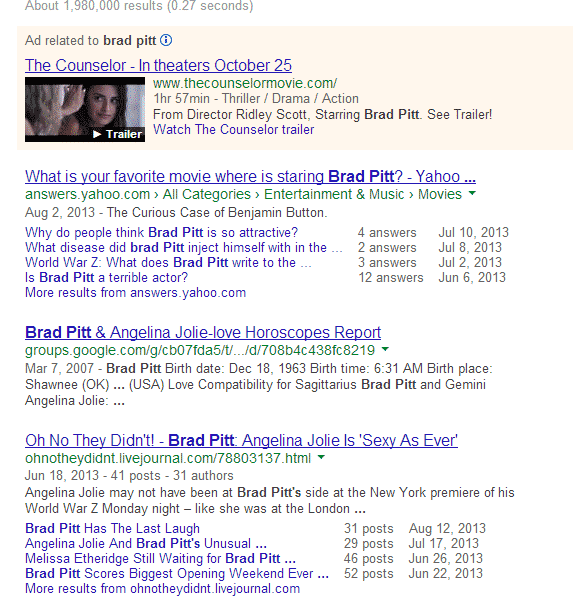What thoughts come to mind in hearing mention of celebrities such as Brad Pitt and Jennifer Aniston?
Let’s take a look Pitt-related Google discussion results:

Brad has a new movie coming out; people want to know why he’s so ‘hot’; and bloggers wax poetic on how he and Angelina stay ‘sexy as ever.’ These are more than kind and positive sentiments related to the international star.
What about Jennifer Aniston, his former wife? She’s inspiring conversations regarding preparation for her sexy role in current movie, We’re the Millers, a film with an above 80% ‘liked it’ rating and millions in box-office earnings.

Us vs. Them
It’s no secret. The celebrities are doing well. If we think about it, it’s likely better than we’re doing. Amid a country hungry for ongoing entertainment news, it’s easy for Americans to compare themselves to the more rich and famous lives led by chronicled celebrities.
Upward social comparison prompts one to view themselves in relation to someone of superior social or economical standing, such as celebrities. We want to be like them, and since this is genetically impossible, marketers look for other ways to convince us we can be like them.
However, if constant social cues remind us we are not alike, or at least not viewed to be as prestigious nor lead the lifestyle to go along with the adjective, are we really identifying with particular services and products as advertisers hope?
Advertisers align a product/service (A) with recognized and revered celebrities (B), hoping observers and consumers (C) assume the following logic:
If C desires to be like B (C=B), then C will eventually equal B because A+C and A+B occur.
The consumer becomes more like the celebrity due to the commonly shared/experienced product or service, which can be a cologne, shoe style, workout routine, religion, etc.
Do we actually make such associations?
Some sociological theories observe:
“… a firm basis for arguing that advertisements featuring celebrities who closely resemble the potential consumers of the promoted product are more likely to serve their purpose.”
Hornstein, Fitch, and Holmes left wallets around Manhattan, fixed with $2, a note, and a return address, with differences regarding:
- An articulate English writer versus a supposed foreigner
- Positive, negative, and neutral tones of voice within
Letters penned by ‘foreigners’ resulted in a 30% wallet return rate, but those written by a ‘native’ using a positive or neutral tone garnered a 65% return rate, making researchers conclude people are more likely to act upon prompts involving those similar to them.
Celebrities and Associations
While only a select few of us will ever achieve the level of stardom similar to the likes of a Pitt or Aniston, advertisers are better off having us ‘compare’ ourselves to people aligned with a reasonable and realistic level of achievement.
Should makeup brands feature super-model faces, health-drink brands host many-muscled endorsers, or guitar advertisers tune ads around prodigies?

This past year, one weight-loss brand started using ordinary people in advertising rather than celebrities; their marketing team’s impetus adjacent to the closing thoughts of the social psychology researchers above:
It’s much easier for an observer to grow agreeable when behavior is ‘modeled’ by a person of similar aptitude and situation.
“We just feel like people don’t connect as much with celebrities…Because they know that perhaps the celebrities also may have had a personal trainer or a personal chef, which normal people don’t have.”
and…
“I think they’re brilliant because they feel authentic…They didn’t feel staged, they didn’t feel trite — they were all very believable, and that’s what’s going to make them resonate with people.”
If it makes you feel better, view two clips from Pitt and Aniston early days in film (Pitt was in B-movie, Cutting Class, and Aniston in the first Leprechaun movie.) Even celebrities compare and contrast; some present moments are better than those of the past.

Reaching the Audience
Advertisers can make better impressions and save more ad dollars by emptying pursuits of celebrities and filling them with representations within the means of ‘the norm’ when aligning products, services, and sought market behaviors.
